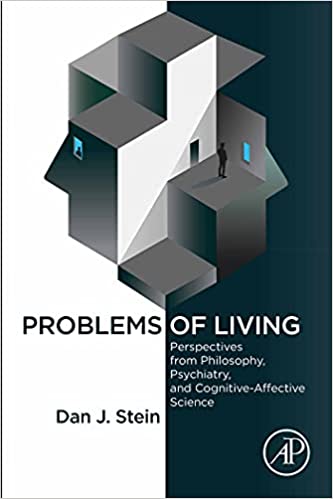Identifying and (sort of) solving big questions about and problems with life and humanity
Full Title: Problems of Living: Perspectives from Philosophy, Psychiatry, and Cognitive-Affective Science
Author / Editor: Dan J. Stein
Publisher: Academic Press, 2021
Review © Metapsychology Vol. 25, No. 35
Reviewer: Timothy M. Crowe
This intriguing book starts with a quotation of the first two and last stanzas of W. H. Auden’s poem The Labyrinth. In the first, Anthopos apteros – literally “wingless man” – meanders happily, lost within the maze of life. By the second stanza, he realizes that he is existentially lost, grounded in a hopelessly chaotic world. In the last, he wishes he had wings and could see things from a bird’s-eye view that would help him quell his doubts.
The author is a ‘grounded’ psychiatrist who uses the ‘wings’ of philosophy and evolutionary biology to explore psychiatry and some of life’s ‘biggest’ questions and problems. “What sort of things are humans? and “What is life about?” He does this by employing integrated classical/ continental/analytic philosophy (spanning Socrates and René Descartes to Ludwig Wittgenstein and Karl Popper and Thomas Kuhn to Michel Foucault and Jean-Paul Sartre) and biological evolution (reflecting the thinking of Charles Darwin to Niko Tinbergen, Theodosius Dobzhansky and E.O. Wilson), drawing inter alia on psychiatric contributions from Sigmund Freud and – locally in South Africa – on Joseph Wolpe, an early investigator of PTSD. He even ‘dances’ with Stoicism and Epicureanism.
Continental philosophy rejects the view that the natural sciences, empiricism and rationalism are the most accurate way of understanding natural phenomena. Its proponents emphasize lived experience determined by context, space and time, language and culture. Alternatively, analytic philosophy is continuous with, or subordinate to, those of the natural sciences, assuming that all developments can be explained by fundamental principles, with historical changes being secondary.
The author maintains that questions relevant to the “brain-mind” problem can be dealt with from a ‘wetware’ perspective that goes beyond standard Freudian and formalized computational metaphors. He employs cognitive-affective science that integrates psychological theory and neuroscience to understand how both genes and environments influence brain development and behaviour. This approach dispels the idea that behaviour is the result of universal personality traits. It also arises from individuals’ perceptions of themselves in particular situations that provide context necessary to respond adaptively to the world. His goal is to replace simplistic and dualistic accounts and experiences with complex and integrative ones and foster explanatory pluralism and balance.
Cognitive-affective science sheds light on why particular activities and objects give humans so much short-term pleasure but warns that they should not be elevated to the sole goal of their lives. An evolutionary understanding of our reward system indicates that evolution aims for propagation of the species, rather than for the happiness of individuals. Psychiatry, informed by neuroscience and evolution, sheds light on how certain pathologies of pleasure emerge, as well as on the possibility of treating them constructively. Cognitive-affective science suggests that our embodied sense of morality has its roots in long-evolved cognitive-affective processes – so similar in many ways to those of non-human primates – that involve nurturance and co-operation.
Although the author provides no definitive answers to ‘big questions’, he wisely takes the fallibilistic position that anyone confident they have conclusive answers is on the wrong track. Similarly, one of the conclusions offered is that the value of each of us going through our own developmental process imaginatively — aided by metaphors for living and becoming skilled in our practical judgment — helps to answer big questions and address hard problems and become skilled in our practical judgment. The fortunate ones develop ways of thinking and feeling that progress towards truth, beauty, and goodness, and a flourishing life.
In an attempt to avoid the extremes of scientism and cynicism, the final chapter introduces a number of different “metaphors of life” and their potential value for addressing the big questions and hard problems and is an attempt to distil and pour some wisdom about life. This is done in the spirit of Oscar Wilde’s admonition “everything in moderation, including moderation”; the Western Aristotelean view of expressing of emotions by seeking an intermediate, balanced, “golden mean”; and following the “middle path” of Asian philosophies.
Now my ‘take’.
First, I really don’t see how one can ‘integrate’ and find a “golden mean” between the products of continental and analytical philosophy. They are largely mutually incomprehensible and incompatible, although their deficiencies and strengths can be viewed as complementary.
Instead of seeking what may be a meaningless ‘mean’ and ineffectual ‘intermediacy’, why not engage in an energetic, exuberant, and confrontational ‘multi-lectic’ of competing theses and use Hegelian sublation to generate a truly meaningful and resilient synthesis that embodies the useful and complementary elements of the competing theses?
This notwithstanding, I read -and greatly benefitted from – Problems of living… from cover to cover in one sitting and expect others to do as well.
Timothy M. Crowe, FitzPatrick Institute of African Ornithology, DST-NRF Centre of Excellence, Department of Biological Sciences, University of Cape Town, South Africa
Categories: Philosophical
Keywords: philosophy, psychiatry

